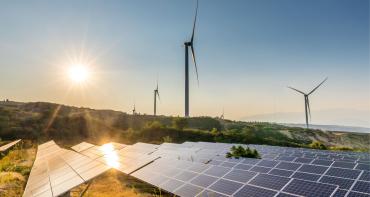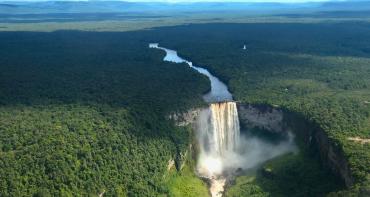An increasingly important aspect of Commonwealth cooperation to fulfil our collective commitment to sustainable development is our work on halting - and wherever possible - reversing the very severe desertification and degradation which occurs when land is used carelessly or too intensively.

An increasingly important aspect of Commonwealth cooperation to fulfil our collective commitment to sustainable development is our work on halting - and wherever possible - reversing the very severe desertification and degradation which occurs when land is used carelessly or too intensively.
The nations of the Commonwealth are set in every continent and ocean, and we see land degradation having seriously negative impacts and impeding development in all our regions.
The interconnection of land use and healthy terrestrial and ocean ecosystems with climate is delicate, and imbalance or overexploitation can disrupt the harmonious interaction that sustain the health of life on our planet. The process spirals as climate change in turn exacerbates land degradation, with dryland ecosystems being particularly vulnerable.
Once such vicious and self-reinforcing processes and interactions take hold, they become increasingly difficult to arrest. This threatens global food security and poverty eradication. Indeed, without decisive action, almost all the 2030 Sustainable Agenda goals will slip beyond possibility of being achieved.
So action on SDG 15 which refers specifically to Life on Land also makes a vital contribution towards the reduction of greenhouse gas emissions which lead to global warming, and measures on Climate Action under SDG 13 directly affect terrestrial ecosystems, desertification and land degradation.
From the earliest beginnings of the Commonwealth, commitment to interdependence and inclusiveness have inspired and motivated cooperation among our governments and peoples. By continuing to plan, act and work together in a spirit of goodwill and mutual support, our 53 member countries of vastly differing sizes, stages of development and geographical location are able to join together in tackling land degradation and desertification caused by climate change, and climate change driven by degradation and desertification. These are daunting tasks, particularly for small states and vulnerable developing countries.
The approaches we adopt as a diverse yet connected family of nations accord both with our own Commonwealth Charter, and with the UN Convention to Combat Desertification COP-14 commitment to ‘promote opportunities that support, as appropriate and applicable, the long-term goals of the Paris Agreement taking into consideration land-based solutions for climate action’.
Our Commonwealth Climate Finance Access Hub is already significantly boosting the capacity of several of our member states to address climate change, and has immense potential to add to the resources and capabilities on which Commonwealth countries can draw to address the causes and impacts of land degradation and desertification.
The hub helps small and vulnerable countries to access international sources of climate finance. For example, it has assisted Jamaica with a successful bid to secure a US$0.6 million grant to fund efforts to reduce emissions from deforestation and forest degradation (REDD+) as part of its forest policy. This will help to pioneer the development of new models for Caribbean countries to achieve sustainable land restoration and reforestation.
For arid countries such as Namibia, in Sub-Saharan Africa, which are highly prone to land degradation and desertification, the Commonwealth Climate Finance Access Hub is providing support to governments on developing projects around food and water security via sustainable agriculture. By doing so, the Commonwealth collectively adds to the ability of individual member countries to deliver on their climate change policies and Nationally Determined Contributions (NDCs).
Commonwealth Secretariat efforts towards implementation and mainstreaming of regenerative models of development are also opening up new pathways towards reversing the impacts of land degradation and desertification. Community driven regenerative development models have the potential to facilitate the reversal at scale of land degradation, providing small states and vulnerable developing countries with appealing opportunities for meeting NDC commitments and SDG targets.
As we continue to enhance Commonwealth programmes of support in response to the needs of our member countries individually and collectively, a particular focus is on how to leverage partnerships and build on synergies. Participatory and multi-stakeholder initiatives in which the Commonwealth has long excelled offer models and means to reduce, halt or even to reverse the rate of desertification and land degradation driven by climate change, and help communities to mitigate or adapt to the effects of drought.
Such efforts are a vital Commonwealth contribution towards our member countries being able to achieve the full range of objectives to which they are committed through the 2030 Agenda for Sustainable Development.



